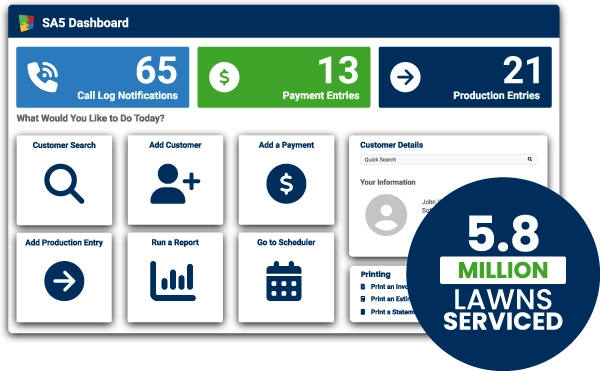As a lawn business owner, you know there’s never enough time in the day to do everything that needs to be done. The good news is that, whether you are just starting as a lawn care business or a seasoned company, there are ways you can use automation technology to make things easier while also boosting your sales.
In this blog post, we’ll look at how automating certain parts of your lawn business can help increase sales, whether that means deploying an AI tool to help you make sales, automating everyday processes like estimates and marketing, or even using robotic equipment to get the job done.
The Rise of AI in the Lawn Care Industry
The integration of Artificial Intelligence (AI) and automation into the lawn care industry marks a transformative era for businesses operating within this space. These technologies offer unprecedented opportunities for efficiency, accuracy, and scalability. AI-driven tools, from customer relationship management systems to equipment operation, are streamlining operations, enabling lawn care professionals to deliver more personalized, efficient services. This shift not only enhances operational capabilities but also sets a new standard for competitiveness and growth in the sector. As businesses adopt these innovations, they’re finding new ways to thrive in an increasingly digital landscape.
Understanding Automation in Lawn Care
Automation in lawn care streamlines operations, from scheduling services to operating equipment, enhancing efficiency and accuracy. It involves using technology to automate repetitive tasks, such as lawn mowing with robotic mowers, and management tasks, like customer communications and billing, through software. These technologies reduce manual labor, optimize resource use, and improve service delivery, allowing businesses to focus on growth and customer satisfaction. Benefits include increased productivity, cost savings, and the ability to offer personalized services, positioning companies as modern and competitive in the market.


Our List of the 6 Key Ways to Use AI & Automation for Your Lawn Care Business
Embracing AI and automation technologies offers lawn care businesses innovative ways to streamline operations and enhance customer engagement. Here are 6 key ways to leverage AI in your lawn care business:
1. Easy Estimating (Estimating Software)
Creating accurate lawn care estimates can be a time-consuming and often frustrating process. You need someone on the road all the time, visiting property after property. Bad weather can put a halt to your plans, as can unruly pets or locked entrance gates. Using a technology-based measurement and estimating tool effectively eliminates these roadblocks while saving time, effort, and labor hours.
The most effective tools utilize interactive digital mapping, high-quality imagery, and advanced algorithms that enable users to measure properties and generate detailed estimates quickly and accurately.
2. Chatbot-Generated Sales (AI Chatbot)
 Machine learning and AI tools can help companies grow by making sales easy and helping you capture leads you might otherwise lose. With an AI-enabled chatbot on your company’s website, you can respond to leads whenever they come in.
Machine learning and AI tools can help companies grow by making sales easy and helping you capture leads you might otherwise lose. With an AI-enabled chatbot on your company’s website, you can respond to leads whenever they come in.
A tool like ServiceBot will guide visitors through the entire sales process with a brief text-based chat, asking them leading questions about their property and what they’re looking for, then providing them with accurate estimates and customized program recommendations, even overcoming common sales objections. It ensures quick responses to inbound leads, makes sure there’s a standard set of probing questions for each prospect, records information for every lead, sends an instant proposal, and makes it easy for customers to buy and pay right away.
3. Robotic Equipment (AI Lawn Mower)
Can you really take people out of the equation when it comes to the actual physical work of lawn care and maintenance? Some companies are trying. According to a recent report published by Allied Market Research, the global robotic lawn mower market is projected to reach more than $1,437,000,000 by 2025.
While most of these mowers still require a human to run them via remote control, one company is producing a totally autonomous mower that runs on AI self-mapping technology, following a path it sets for itself, using sensors to avoid obstacles, and automatically returning to a charging station when it needs to top off its battery before picking up where it left off.
4. Automate Your Marketing (AI Marketing)
 Effective marketing should be a priority for your business, but not only does it take certain skills to accomplish, but it also takes a lot of time. With the right technology, you won’t have to spend hour after hour developing strategies and creating content.
Effective marketing should be a priority for your business, but not only does it take certain skills to accomplish, but it also takes a lot of time. With the right technology, you won’t have to spend hour after hour developing strategies and creating content.
Automated marketing is also effective for cross- and upsell messaging. An automated marketing program that works with your CRM is essential here; it will pull from customer data already in your system and handle the hard parts of marketing for you, including customizable messaging and templates.
5. Route Optimization/Scheduling (AI Scheduling)
Spreading out a mind-numbing array of paper maps and manually plotting out service routes can be complicated, frustrating, and, above all, time-consuming. Automating this essential function can save hours upon hours every day by eliminating all of that hassle while also creating better, faster, more efficient routes.
Machine learning enables automated routing programs to instantly create the most optimized routes and schedules for your entire crew, saving time, money, and fuel. Automation makes it easier to customize your routes based on your exact specifications—flag by service type, make note of new customers (or past-due customers), plan routes by days of the week, or any other details that meet your specifications.
6. What About ChatGPT?
 If you haven’t yet heard of ChatGPT, Jasper, or the many other AI writing tools currently taking over the internet, you soon will. AI-assisted writing is making a major splash. With these programs, you ask the bot questions or provide prompts based on what kind of content you would like to generate. The more specific your prompts, the better, more effective content the bot will generate.
If you haven’t yet heard of ChatGPT, Jasper, or the many other AI writing tools currently taking over the internet, you soon will. AI-assisted writing is making a major splash. With these programs, you ask the bot questions or provide prompts based on what kind of content you would like to generate. The more specific your prompts, the better, more effective content the bot will generate.
For lawn companies, a tool like this can speed up the way you approach customer service, recruiting and hiring, and more. An AI tool can quickly write accurate and effective job descriptions and personalized sales pitches based on customer data, emails, and more.
Challenges and Considerations in Adopting AI Technologies
Adopting AI and automation in lawn care brings several challenges and considerations that businesses must navigate. These include:
- Initial Investment: The upfront costs for AI technologies and equipment can be substantial, requiring careful financial planning.
- Training Requirements: Employees need training to effectively use new AI tools, which can involve both time and additional costs.
- Integration with Existing Systems: Ensuring new technologies work seamlessly with current business systems can be complex.
- Data Security: With increased use of digital tools, safeguarding customer data becomes crucial.
- Adapting to Change: Businesses must be ready to adapt their operations and possibly their business models to fully leverage AI benefits.
These factors are critical for lawn care businesses to consider as they explore the potential of AI and automation to transform their operations.
Transform Your Lawn Care Business with RealGreen
At the end of the day, automating your business will help you grow faster and maximize efficiency. A company like RealGreen, with its complete suite of end-to-end, integrated business solutions, can help you unlock the full growth potential of your business with data-driven insights and advanced capabilities. It’s never been easier to grow – schedule a free demo today to find out more.

